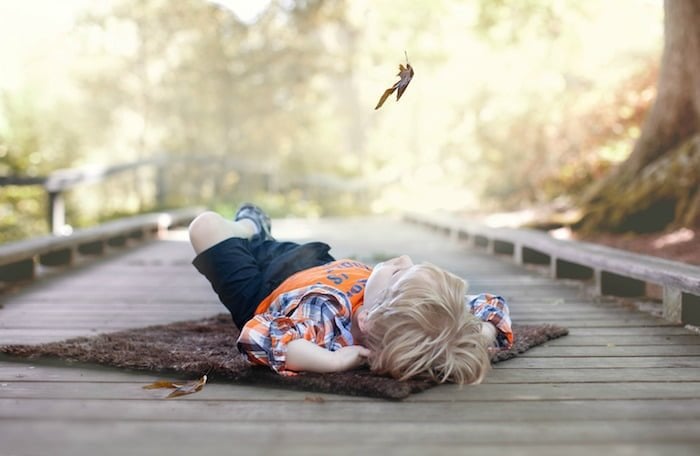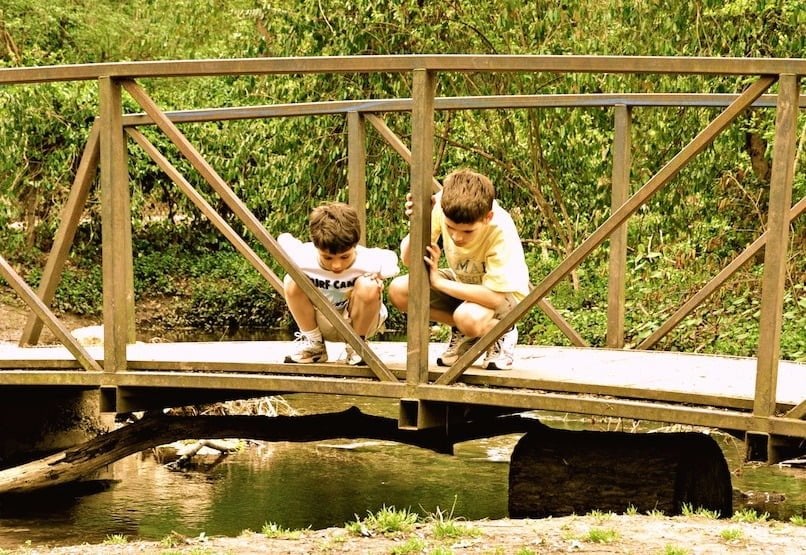Want happier, calmer kids? Simplify their world.
If the schedules and screens are making you feel like you’re losing track of or losing touch with your child, it’s time to simplify.

The benefits of simplifying your child’s world are many. And it can make your life more fulfilling, too. Children flourish when they have the time and space to explore their world without the constraints of “too much.”
The Problem with “Too Much”
“Too much” is overwhelming and stressful, whether it’s too much stuff, too much information, too many activities, too many choices, or too much speed – always hurrying from one task to the next… with never a moment to relax or play.
Having and doing too much can overwhelm a kid and lead to unnecessary stress at home and in the classroom. It’s not only stressful for kids. It can add to the already exhausting mental load for parents.
Simplifying a child’s routine, surroundings, and reducing information- and activity-overload can help overstimulated kids become less argumentative and disruptive.
When you simplify a child’s world, you make space for positive growth, creativity, and relaxation. This, in turn, helps you simplify parenting.
“Many of today’s behavioral issues come from children having too much stuff and living a life that is too fast,” says Kim John Payne, author of Simplicity Parenting: Using the Extraordinary Power of Less to Raise Calmer, Happier and More Secure Kids.
Payne says that many American kids are experiencing sensory overload with “too many trinkets, too many choices and too much information.” By approaching parenting using simplicity as a framework, parents may be able to significantly reduce a child’s daily stress, which can lead to happier, more successful children.
“Children need time to become themselves–through play and social interaction. If you overwhelm a child with stuff – with choices and pseudochoices – before they are ready, they will only know one emotional gesture: More!”
The easiest way to get started is with your home environment. “As you decrease the quantity of your child’s toys and clutter, you increase their attention and their capacity for deep play. Too much stuff leads to too little time and too little depth in the way kids see and explore their worlds,” says Payne.
Clear Away the Clutter
When clearing out or rotating toys, focus on keeping a mix of toys that your kids consistently enjoy and that keep them entertained for long periods of time. Often, kids’ favorite toys are simple, classic toys – stuffed animals, dolls, building toys such as LEGOs, trains and cars, dress-up clothes, and arts and crafts materials.
Whittle down books to a handful of favorites that can be savored, and remove the rest to create a library to find new reads one or two at a time. Rotate the others in seasonally or as your child’s interests change.
You might also consider a calm down corner so your child has a peaceful space to unwind. Add in some fabric, string, or pillows for creating forts and playhouses, then give your child some time to adjust and create their own play world from this simple selection of toys.
Make Downtime a Priority
Along the same lines, simplifying your family’s schedule can reduce the frantic feeling of always being on the go. Kids with a full plate of school work, extracurricular activities or sports each day may feel stressed and chaotic since they’re lacking the free time children need for creative play and exploration. And when you set effective screen time limits, you’ll keep your child distraction-free and help her learn to find joy in the present moment.
“Rest nurtures creativity, which nurtures activity. Activity nurtures rest, which sustains creativity,” Payne explains in Simplicity Parenting. “Each draws from and contributes to the other.”
As a parent “taxi,” you probably aren’t feeling all that relaxed either.
Cutting back to just one or two of your child’s favorite activities can give them the freedom not only to have that time to play and explore, but also the time to actually practice and focus on the activities they choose.
But what if they’re bored?
Boredom is a good thing! It’s the great instigator and motivator of creativity. Payne says the frustration of having “nothing to do” is usually the start of something wonderful.
Reducing the physical clutter, setting predictable rhythms and streamlining activities has benefits for parents too. “As parents, we also define ourselves by what we bring our attention and presence to. This is easy to forget when daily life feels more like triage,” says Payne.
Simplifying with Kids
By simplifying, we can concentrate on what we really value, not just spend our days reacting to everything the world throws at us. Having fewer toys benefits a child’s imagination and sense of calm.
Simplification is an ongoing process, not something that can be completed in an afternoon or weekend. It takes time to reduce possessions, change habits, and develop new rhythms. It’s not easy to change directions when your whole family is moving at the speed of light and the chaos always feels like it’s creeping in.
Begin slowly, with small changes and an eye toward what you want your family life to look like.
Lighten Up (Mentally & Physically)
“In the tapestry of childhood, what stands out is not the splashy trips to Disneyland but the common threads that run throughout and repeat: the family dinners, nature walks, reading together at bedtime, Saturday morning pancakes.”
With simplification we can bring an infusion of inspiration to our daily lives; set a tone that honors our families’ needs before the world’s demands. Allow our hopes for our children to outweigh our fears. Realign our lives with our dreams for our family, and our hopes for what childhood could and should be.
It comes down to letting kids be kids.
What better reminder do we have than our kids of our own best selves, our less stressed and more carefree selves?
In their silliness we see the echo of the way we used to be: when we were kids, yes, but also before we had kids, or even two weeks ago, before all of the stress of these year-end corporate meetings. Their joy, their infectious enthusiasm, their sense of “mission” as the poor dog is dressed in boxer shorts, cannot help but cajole you, and beckon you, to lighten up.
To simplify is to find a place of balance as you move away from “too much.” Only with less can children learn to fully use their imaginations and figure out what truly brings them joy.
This article was originally published in 2011 and updated in 2023.
If you’re looking to simplify parenting, you might also like:
Play Up Your Child’s Creativity & Imagination with Battery-Free Toys
How Not to Crush Your Child’s Natural Creativity
Why & How to Embrace Minimalist Parenting
Fewer Toys, More Fun! The Benefits of Culling Your Child’s Toy Collection


